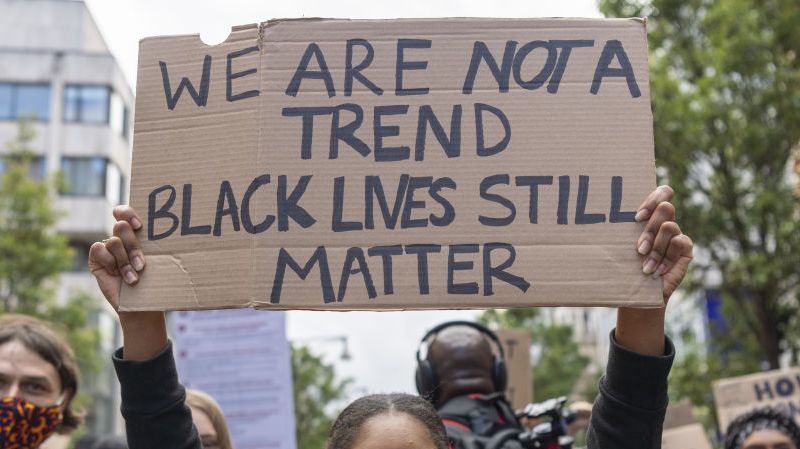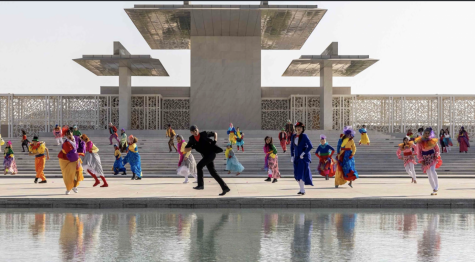A Case Against Performative Activism: The Revolution Will Not be Webinar-ized

A few days ago, I attended a meeting where a white Northwestern University in Qatar faculty member said the n-word. This professor was reading out an article about one of the works of Vershawn Young. The article in question mentioned Young’s book called “Your Average Nigga.” While reading, when this professor reached the title of this book, they decided to read it out too, word for word. They said the n-word out loud, without a single stutter. They did not stop after reading it out to apologize. I froze. I wanted to leave the zoom meeting immediately, but I gave them the benefit of the doubt and waited to see if they would, perhaps, come to their senses and realize what they had just done. Maybe they would apologize once the meeting was over? Spoiler alert: They did not.
I had had to reach out to this professor myself after the meeting, to explain why they shouldn’t have read out the n-word. They told me that they knew the word should not be read out and had said it out of nervousness. Even then, they did not explicitly apologize right away. Instead, I received a proper apology a day later. What made this incident worse was the fact that this person is a white professor who has been preaching anti-racism in classrooms for the past year since the murder of George Floyd. And yet, they still went ahead and read the n-word out loud. Right there, I couldn’t help but question if their activism of the past year had been performative. How can you organize and attend webinars/events about anti-racism and still go on to use the n-word in a conversation?
Although I was disappointed by this one incident, I was unfortunately not surprised. As a Black woman in this community, I have been called the n-word by non-Black people in Education City more than once. I have sat helplessly in classrooms and listened to students defend colonialism and enslavement in the name of academic freedom. There is not a day that goes by that I don’t question if this education is really worth the anger and pain Black students and other marginalized groups are subjected to on a daily basis.
Performative activism was one of the buzzwords of 2020, which was used on social media to call out people who “talk the talk but don’t walk the walk.” “Performative wokeness” and “performative allyship” are related terms, and although their meaning transcends the 2020 Black Lives Matter protests, these words have been used to condemn surface-level acts of solidarity that followed after the murder of George Floyd.
During the global Black Lives Matter protests in June 2020, I saw acquaintances who have been racist towards me and my peers post Black Lives Matter placards on social media. Qatar Foundation made short videos condemning racism in the United States and organized webinars to talk about anti-Blackness. It has now been 10 months since Gorge Floyd was murdered, and I do not see that same level of anger anymore. Where did that anger go? Why did it disappear in the blink of an eye? Was this sudden outrage about racism genuine, or was it just a performative act of solidarity?
Jocelyn Mitchell’s case: Is this progress?
Recently, a group of NU-Q faculty members sent out a letter condemning professor Jocelyn Mitchell’s 2012 blog that has been called out for racist material and argued for her to withdraw from the QNRF grant. This is the first time during my past two years at NU-Q that I have seen a group of faculty members independently decide to distance themselves from institutional constraints to condemn racism. This was later followed by Mitchell’s withdrawal from the QNRF grant, which I personally think was the right thing to do. But there are a few things about this faculty letter and other statements that followed that made me uncomfortable.
The faculty letter cited the June 2020 statement of the African Student Association statement, which, among other things, was urging the NU-Q community to condemn racism and anti-Blackness. In June, when the ASA statement was issued, some faculty members reached out to ASA members personally to discuss how faculty can be more involved, but no statement was issued from them publicly. In November 2020, the ASA issued another statement asking faculty specifically to condemn Northwestern University’s President, Morton Schapiro’s comments on student protests against NU’s close ties with the police and law enforcement. In an email response to ASA leaders, faculty members from the working group on race stated that “concerning any public statements, none of us feel that a statement from our programs would be strategic or a good use of our voices,” which was followed by a request to meet ASA members to discuss this further. From a group of faculty members who decided they were going to “work on race,” this response did not make sense to me. If condemning institutional racism and standing with Black student protesters is not a good use of their voice, then what is?
As someone who has been at the forefront of a lot of community organizing for Black students in our community, I couldn’t help but question why these faculty members never issued any public statements in response to ASA’s requests, but suddenly changed two months later to condemn Mitchell’s comments, and decided to quote our statement while doing so, knowing perfectly well they never really issued a statement on behalf of the ASA’s requests before.
While Qatar Foundation’s anti-racism campaign lasted two ticks, I want to acknowledge that the faculty working group on race at NU-Q organized numerous webinars about anti-racism for a prolonged period. But what good are these webinars if the same professors are not applying what they preach to their daily interactions in classrooms? I know and understand faculty advocacy is also limited by institutional and systemic constraints beyond their control, but they have power that a lot of marginalized students don’t have.
When I opened my social media the day the faculty letter was issued, I saw students celebrating this win and calling these faculty members “the best professors at NU-Q.” But where were they when Black students needed them the most? In fact, one of them is the one who recently read out the n-word in our meeting. The faculty working group on race made a commitment to “work on race,” and I can’t help but question their intentions when some of their actions don’t match the words they preach. Denouncing Mitchell’s comments publicly was one thing, but I want faculty to use that same energy to speak out about all forms of racism and oppression. You can’t pick and choose which struggles you stand in solidarity with, and which ones you shouldn’t if they all stem from the same root. As some of you might argue, we are all on a journey to learn and unlearn, so we should be patient with everyone. My problem with this is the fact that the burden to educate is often put on Black students when we are put in situations where we have to explain to well-educated senior professors why they shouldn’t say the n-word.
Unpacking solidarity and the myth of “I am oppressed so I can’t be racist.”
Amid the recent Mitchell-related outrage, I was disappointed to hear stories from Black students who were asked by members of our community why “ASA was not very vocal” about Mitchell’s case. NU-Q has more than 20 student-run clubs and organizations so ASA should not be singled out as the only club that has to advocate for anti-racism. It is everyone’s responsibility in our community to stand up against injustice, and that’s the cost of genuine allyship. Black students shouldn’t always be the only ones fighting.
During the 2019 protests at NU-Q, everyone, including Black students, protested. It was revolutionary to see the whole student body join hands to fight one cause. But what most people don’t remember or know is the fact that at the same time as NU-Q demonstrations, ASA members and Black students were holding a counter-exhibition to protest Weill Cornell Medicine- Qatar’s white savior photo exhibition about Tanzania, which was sponsored by QF. There we were, fighting two battles at the same time, and we still showed up to stand in solidarity with our community.
Unfortunately, since ASA didn’t get enough support from NU-Q, QF and Weill Cornell Medicine- Qatar ignored our demands, and they never took down the racist photo exhibition. I am bringing this incident back to stress the fact that if anything, Black students have been vocal about racism and anti-Blackness from the very beginning. So, when the tables are turned, it is problematic to only expect Black people and ASA members to stand in solidarity with everyone, while in reality, we are usually left alone when we need support the most.
In a NUQSU meeting that followed the 2019 student protests, I publicly talked about the racism faced by Black students. I stood up, shaking, and recounted the day-to-day racism we go through and encouraged everyone to use the same energy in support of Black students and other marginalized groups. However, the Qatari students present there rushed to tell me to “tone it down” because I seemed “too angry.” What they could have done is listened to me – but, instead, one of these students dismissed me by saying Qataris also face discrimination because “professors think they are lazy and dumb.” Let me clarify this, as I did on that day: I completely disapprove of such unfair stereotypes towards Qatari students, but this stereotype does not in any way equate to my existence as a Black woman in this institution.
In that meeting, I was put in a position where I had to explain, in front of more than 40 people, why playing oppression Olympics and making these unnecessary comparisons disregards the intersectionality and nuances embedded in my lived experiences as a Black woman. I had gone to this NUQSU meeting excited to voice my concerns, but I left feeling helpless and attacked. This was not the first time someone had tried to justify why they can’t be anti-Black or racist because they are a POC.
I want to recount some important things I mentioned in a speech I gave during a panel discussion organized by the NU-Q Faculty Working Group on Race held on Oct.4, 2020. In this speech, I pointed out that, in Qatar and Education City generally, there is a tendency to dismiss conversations about racism and anti-blackness with “I am a person of color so why are you calling me out.” Or there is the classic “I am North African so I can say the n-word.” These are often misleading attempts to justify North Africans’ proximity to Blackness only when it’s convenient for them, but more importantly, it is a reflection of how having a certain proximity to whiteness and nationality in Qatar combine to give privileges and power to non-Black Arabs and Qataris.
An Instagram account called “Black in Education City” was created last year that allowed people to anonymously share their stories about how it feels to be a Black person in this community. This page has revealed a number of tragic experiences faced by Black members of our community, including being racially profiled and singled out by QF security to show IDs when other students are not required to do the same.
Outside of Education City, racism and anti-Blackness is just more blatant. I have personally been attacked in malls by people who touch my hair without my permission. I was once in a mall, shopping, minding my own business, when a group of teenagers surrounded me and began pointing at my big afro, chanting “Black Mushroom.”
So, while it can be easy to dodge accountability by adopting this “all POC face racism” rhetoric, it is important to understand that white supremacy as a system of oppression does not affect all people of color the same way. Having a specific proximity to whiteness grants Qatari people power and advantages Black people and non-Qatari citizens don’t have.
Moving forward: what can you (we) do?
When the ASA issued a statement in June, the leadership of this institution stressed that we have to be patient because “institutional change” takes time. But how long should we wait? In James Baldwin’s words, “How much more time do you want for your progress?” You say you see us and hear us, but if you really do, what are you waiting for to actually start implementing the systemic changes student groups like the ASA have been suggesting for so long?
As someone who doesn’t know the ins and outs of this institution, I’m not an expert on how systemic racism can be solved. But I am certain that performative webinars will not fix our problems. To echo Audre Lorde’s words, “the master’s tools will never dismantle the master’s house.” I think this applies to NU-Q’s use of webinars as an organizational tool to end racism.
Webinars and conversations about racism are important and should be part of our everyday lives, but they are not an effective sustainable tool to address systemic racism in the long run. These webinars are optional talks; they are not mandatory trainings or discussions, so very few members of the community are likely to voluntarily attend. The make-up of some of these webinars is also questionable. How do you invite a panel of non-Black people to talk about anti-Blackness and expect me to show up?
We have had numerous webinars since June, but they have not changed much. Some faculty still leave racist comments unaddressed in classrooms. There are few classes in the Liberal Arts program about African studies and Black history. Even though NU-Q is now in the process of establishing an African Studies minor in collaboration with Georgetown, it should not have taken two years of students pleading to do so. And, even now, it is yet to be finalized. Most importantly, there are only two Black professors in our faculty, and neither of them has permanent positions.
We need more grassroots advocacy from faculty, staff, and students. This includes listening to student groups such as the ASA when they issue statements or make demands. ASA members did have a few meetings with faculty after the ASA statement was issued in June, in which faculty members promised to listen and do their part to amplify Black students’ voices. This was followed by the establishment of the faculty working group on race, but their mission is still rather confusing to me. There is no Black faculty or staff on this committee. The working group on race did not organize any programming for Black History month this year, a concern the ASA had raised in the June statement as well. Among other things, the working group on race needs to clarify their intentions, long-term goals, and organize public meetings to listen to student concerns that need attention. One of their primary concerns should be to integrate anti-racism into NU-Q’s curriculum.
As a community, we need to redefine solidarity and avoid pitting marginalized groups against each other. The goal here is to find useful intersections for collective advocacy. We need to constantly center the voices of the most marginalized and neglected people in our community, this includes Black students, LGBTQIA+ students, low-income students, and other marginalized groups.
In Qatar, there is racism and anti-Blackness targeting Black immigrants, Black Qataris, citizens of African descent, sub-Saharan refugees, migrant workers from South Asian countries, etc. The racism faced by these groups is perpetuated in different ways and the experiences of these people are not the same. Each of these groups lives at the intersection of privilege and discrimination. While I can only speak about my personal experiences, it is everyone’s responsibility to challenge and question how our personal biases influence how we see the world.
How do you personally contribute to anti-Blackness? What are you doing about it now that Black Lives Matter is not trending anymore? Black Lives still matter. It might not be trendy, but they still do.
Lastly, anti-racism work is not for personal gain or feel better work. These are people’s lived experiences. It requires a lifetime of work for the collective and our community members need to grapple with this. Doing the bare minimum to acknowledge, understand and stand with the people of your community does not mean you deserve applause. These actions are the least you can do, and, if anything, they are expected of you. As Chimamanda Ngozi Adichie said, “Racism should never have happened and so you don’t get a cookie for reducing it.”
The author is the co-founder and previous president of ASA (2018-2020) and a teaching assistant for Mitchell.
The author is a managing editor for the Daily Q. However, the views expressed in this article are the author’s own and do not necessarily reflect The Daily Q’s editorial stance.












